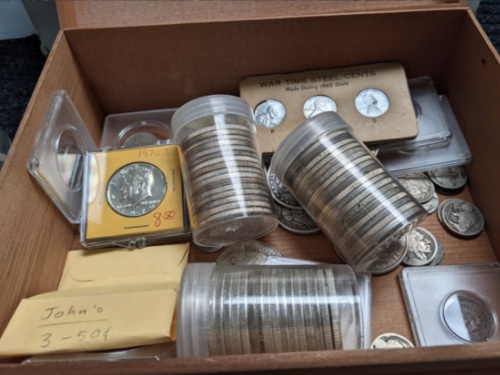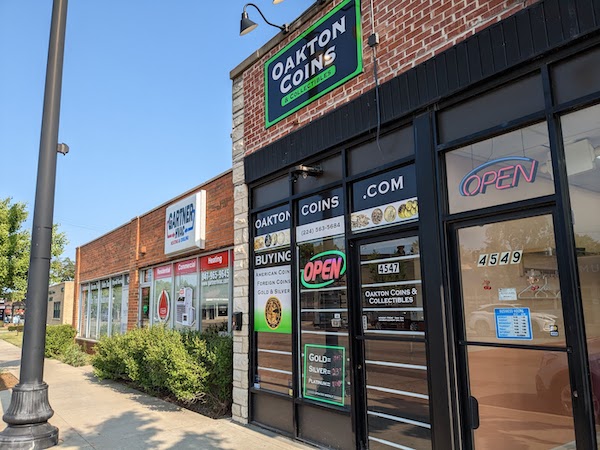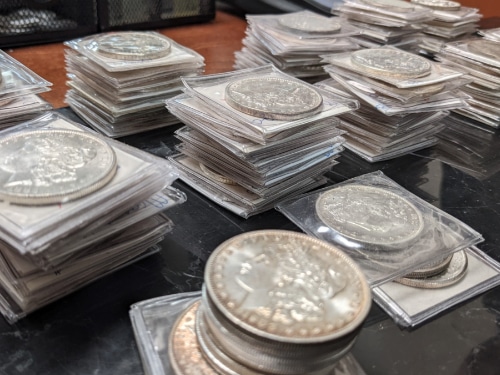Oakton Coins & Collectibles is renowned as one of the top-rated coin shops near Wisconsin, offering exceptional services for those looking to sell their coin collections. Whether you’re an experienced lifelong coin collector or have recently inherited a collection, the process of selling coins can be daunting. At Oakton Coins & Collectibles, we understand this and aim to simplify the process for you. Although our physical location is in Northern Illinois, we cater to customers from Wisconsin as well, who often choose to visit or mail us their collections. We facilitate communication through email or texting for the appraisal process, ensuring convenience for our customers. Rest assured, we cover the shipping costs and provide prompt payment via check. Our reputation for discretion and offering consistently high payments has earned the trust of many individuals from Wisconsin.
Guidance on Selling Coins in Wisconsin
When selling coins, it’s essential to consider various factors. The value of your coins can range from face value to a substantial amount. People collect coins not only for their monetary worth but also for other reasons, including low-value or face-value coins. Regardless of the size or value of your collection, we are here to assist you.
While some individuals sell their entire collections, others choose to sell only the valuable pieces and divide the remaining coins among relatives. Many customers prefer to send us their coins carefully organized by date and decade, placed in separate Ziploc bags, paper envelopes, or coin tubes. While organizing your collection in this manner may seem tempting, it is not necessary.
During the appraisal process, our first step is to separate coins based on their composition, such as copper, nickel, silver, or gold. However, if you feel compelled to organize your collection, please group them as follows:
- Gold coins
- 90% silver dollars (1878 through 1935)
- 90% silver dimes, quarters, and half dollars (1892 through 1964)
- 40% silver JFK half dollars (1965 through 1970)
- Lincoln wheat cents (1909 through 1958)
- Buffalo nickels (1913 through 1938)
- Jefferson nickels (1938 and later)
- All other obsolete U.S. coins
- U.S. mint proof and uncirculated sets
- U.S. mint commemorative sets
- Currency and paper money
- Foreign coins/tokens
Determining the Value of Your Coin Collection in Wisconsin
Coins of varying values are available for purchase in every budget range. To assess the value of your collection, ask yourself the following questions:
- Can you determine the amount the collector spent or the frequency of coin purchases?
- Can you find any bills of sale, invoices, or canceled checks from dealers or auction firms?
- Do you possess an insurance policy or a will with specific instructions?
While this information may be useful, it should not be solely relied upon. The value of coins and collectible paper money, like any other commodity, is determined by the agreement between a willing buyer and seller. This amount is never fixed, as the market fluctuates unpredictably.
Pricing Your Coin Collection for Sale in Wisconsin
In most cases, you will not receive the exact value listed in pricing guides when selling coins. These guides merely help establish a price range that you can reasonably expect for a coin. Many consumer guides display significantly inflated values.
When selling coins, it’s crucial to understand terms such as clickbait pricing, real-world pricing, melt-value pricing, and numismatics pricing.
- Clickbait Pricing: This pricing method relies on sensationalist headlines to attract attention and generate online advertising revenue. Claims suggesting that common coins could be worth significant amounts are rarely valid.
- Real-World Pricing: This approach reflects the actual amounts paid when coins are sold, representing true market value. It is based on tangible transactions rather than mere advertisements. Ultimately, a coin is worth what someone is willing to pay for it, with rarity and condition being key factors in determining its monetary value.
- Melt-Value Pricing: Prior to 1965, most United States coins contained gold or silver (with a few exceptions). Any premium above the melt value stems from the coin’s numismatic value.
- Numismatics: Numismatics involves the study of coins, paper currency, and metals. Coin rarity and condition are significant factors in determining the prices collectors are willing to pay. Some coins possess high numismatic value regardless of their metal composition.
Places to Avoid when Selling Coins in Wisconsin.
- Jewelry Stores and Pawn Shops: These establishments typically focus only on the precious metal value of gold and silver coins, offering only a small percentage of their actual worth.
- eBay: While many coins are sold on eBay daily, selling coins through this platform can be risky, time-consuming, and costly.
At Oakton Coins & Collectibles, we strive to provide a hassle-free experience for individuals looking to sell their coins from Wisconsin.
Sell Coins near Me – Wisconsin
Oakton Coins is conveniently located right near 94 West (Kennedy) near downtown Skokie (very close to Chicago), and less than two blocks from the Oakton stop on the Yellow Line CTA (Skokie Swift). Milwaukee, Madison, Green Bay, Kenosha, Racine, Appleton, Waukesha City, Eau Claire, Oshkosh, Janesville, West Allis, La Crosse, Sheboygan.



